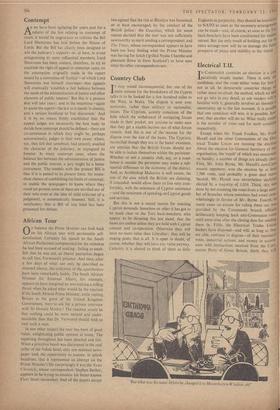African Tour
N balance the Prime Minister can look back on his African tour with pardonable self- satisfaction. Certainly his speech to the South African Parliament compounded for the mistakes hs had been accused of making: failing to estab- lish that he was not, as liberal journalists began to call him, Verwoerd's prisoner. And then, after a few days of what can only be described as stunned silence, the criticisms of the apart heiders have been remarkably feeble. The South African Minister for External Affairs, for example, appears to have imagined he was making a telling thrust when he asked what would be the reaction if the South African Prime Minister, while visiting Britain as the guest of the United Kingdom Government, were to ask for a private interview with Sir Oswald Mosley? The reaction would be that nothing could be more natural and under- standable than that Dr. Verwoerd should wish to visit such a man.
In one other respect the tour has been of great value; enlightening public opinion at home. The reporting throughout has been detailed and fair. When a primitive bomb was discovered in the coal cellar of the Ndola hotel, only one national news- paper took the opportunity to. assume, in splash headlines, that it represented an attempt on the Prime Minister's life (surprisingly it was the News ('hronicle, whose correspondent, Stephen Barber, appears to be trying to emulate his better-known Fleet Street namesake). And all the papers except two agreed that the riot at Blantyre was fomented, or at least encouraged, by the conduct of the British police : the Guardian, which for some reason decided that the tour was not sufficiently newsworthy to merit sending a correspondent; and The Times, whose correspondent appears to have been too busy finding what the Prime Minister was having 'for lunch ('grilled Nyasa Chambo and pheasant flown in from Scotland') to have seen what the other correspondents saw.






































 Previous page
Previous page